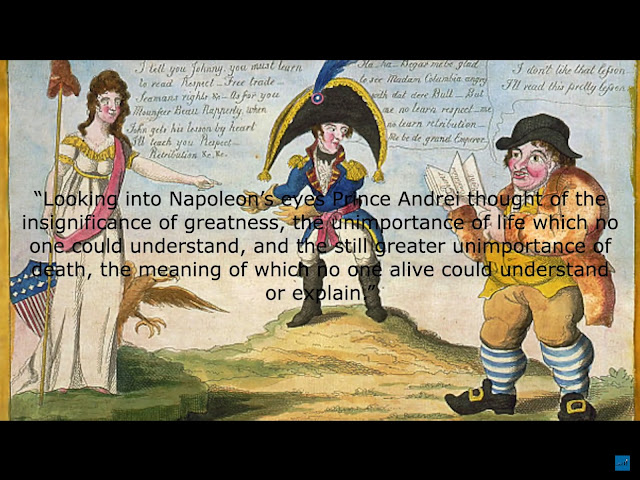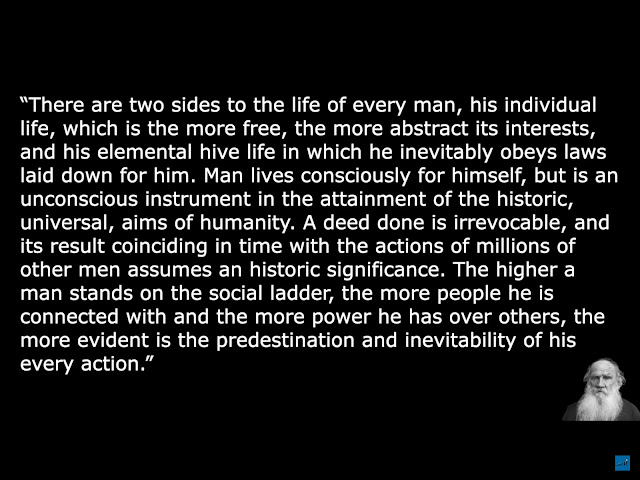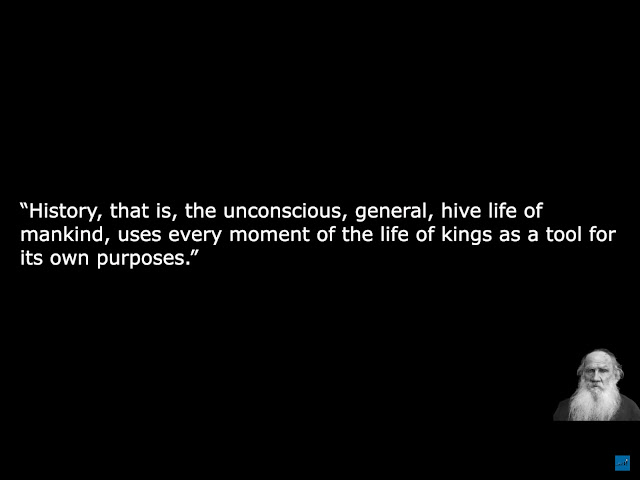Seemorerocks
I first read “War and Peace” almost 50 years ago but many aspects of much of what I read back then have stayed with me – especially the philosophy.
I have often said (and am usually misunderstood) by saying: “if Donald Trump had not existed they would have to have invented him”.
This reflected my vague understanding of Tolstoy’s view of history. I recently came across an excellent review (below) of Tolstoy’s novel that has allowed me to come back to the idea that it is the forces of history that throw up the figures that history books put on centre stage.
The idea is that it is the forces of history that throw up these larger-than-life figures.
Napoleon, according to Tolstoy, was somewhat like a puppet – an accidental leader pushed forward to lead the French.
If he were to have come at a different period in history, he would not have been able to mobilise a small village, let alone the entire French nation.
It is similar with other figures of history such as Adolf Hitler.
True too, with the comic gnome, Volodymir Zelensky.
If other factors had not come into play he would have remained an obscure comedian.
Like another small man before him, Napoleon, he has a highly-exaggerated view of his own importance.
Historical irony
‘War and Peace’ is set in the years 1805, from the defeat of the Russian and Austrian armies at the Battle of Austerlitz to 1820 and the lead-up to the Decembrist rebellion against the tsar.
Russia in 1805 was largely made by the empress, Catherine the Great who ruled Russia from 1762 to 7096.
She made French her official court language so most of the Russian nobility spoke French better than they spoke Russian.
That reminds me of post-Soviet Russia where much of the elite until recently looked to the West for everything.
The irony is, though, that Napoleon really did not have to invade Russia because those who ruled Russia were all French speaking people.
The Russian aristocrats loved French culture and they even read French literature.
The irony is that the effect of Napoleon’s invasion was, In fact, to hinder French culture from flourishing in Russia and instead served to cement a true Russian culture and gave rise to Great Russian nationalism.
TOLSTOY’S PHILOSOPHY OF HISTORY
Tolstoy’s novel is at once a novel, a history book and also a meditation on life.
I wish to concentrate on the latter two aspects.
If you open up almost any history book and you will find it is the history of heroes and anti-heroes, and ordinary folk are unimportant.
They tend to focus solely on the kings and generals.
In other words, fictional heroes.
There is very little about the peasants or soldiers who actually fought in the wars.
Tolstoy believed these so called historical heroes, such as Napoleon, couldn’t have changed the course of history by themselves, but that it was the entire society – from those fighting in the trenches to the peasants producing the food to the farmers feeding the horses, and to the women who looked after the children, that shape history.
As Tolstoy writes:
“The movement of nation is caused not by power nor by intellectual activity, nor even by a combination of the two as historians have supposed, but by the activity of all the people who participate in the events, and who always combine in such a way that those taking the largest direct share in the event take on themselves the least responsibility, and vice versa.”
To what extent do political leaders play the key role?
Perhaps the reason most politicians break their promises is very simple – they are unable to implement change.
NAPOLEON LEFT OUT
Napoleon, the superhero of history books, is caricatured in ‘War and Peace’ while other characters who don’t make it into history books are depicted as real humans by Tolstoy. This is brought out in an episode where Prince Andrei Bolkonsky, previously in awe of Bonoparte, is lying down on the ground, wounded, as Napoleon happens to pass by.
In an episode I can remember clearly from the movie, Prince Andrei reflects:
Looking into Napoleon’s eyes, Prince Andrei realised the insignificance of greatness, the unimportance of life, which no one could understand, and still greater, the importance of death, the meaning of which no one alive could understand or explain.
Tolstoy tells us the historical figures are not as big or heroic as our imaginations make them. So in essence, history is a work of fiction because Napoleon is made bigger because we’re led to believe he was greater than he was.
As I have pointed out previously, the gnome, Zelensky stands out while the world praises him as one of the great world leaders.
What was the greatness of General Kutuzov?

What’s interesting is that Tolstoy shines up Kutuzov’s reputation without trying to whitewash his flaws. We still see how old, out-of-shape, tired, and even lazy the man is. By showing us the human characteristics and the multi-dimensionality of these and other historical figures, Tolstoy takes the Manichean tendency out of history
P.S. Manichaeism refers to any belief system that has a black-and-white, good-and-bad approach to morality, skipping over any nuance or gray areas
Tolstoy was influenced by Arthur Schopenhauer’s will and representation.
To understand this, let’s briefly look at the two major secular philosophy called schools in Europe, the rationalists and the empiricists.
The rationalist believed that we understand the world through reason; reason alone is enough to know the world.
The best example is Rene Descartes, who sat in his armchair and rationalised “I think therefore, I am.”
So, rationalists rely on ideas and thoughts to know what’s going on.
The empiricists, represented by English and Scottish philosophers like Thomas Hobbes and David Hume, however, rely less on rational ideas but more an empirical data ie our experience in the real world to understand the world.
Rationalism is an inside out approach, while empiricism is an outside in approach.
The German philosopher Immanuel Kant tried to bring these two schools – the rationalists and empiricists – together, arguing that we humans, by rationally categorising the world, impose our own structure on it. So we are not passive observers of reality, but actively making reality conform to our categorizations.
Kant also made a distinction between two realms: phenomena or reality as they appear to us, and noumena or reality as it is.
This is a term also used by Indian Advaita philosopher, Ramesh Balsekar.
In his usage, phenomena corresponds to the world as we perceive it, whereas noumena corresponds to the world as it is.
Arthur Schopenhauer argued that the world that appears as ta reality of history is not the world that actually exists independently of us. According to Schopenhauer, human will is like a lens through which we see and interpret, and even study the world.
Putting it simply: “Who we are is nothing but Consciousness itself“
Getting back to ‘War and Peace’, Tolstoy argues that historical events are not the result of individual leaders’ will or whim, but rather bigger social forces are the will of the entire society that take a country to war, not its leaders.
Hitler couldn’t have mobilised Germany if the socio-economic conditions were not right.
Napoleon, according to Tolstoy, was somewhat like a puppet, an accidental leader pushed forward to lead the French.
If he were to have come at a different period in history, he would not have been able to mobilise a small village, let alone entire French nation.
For Tolstoy, leaders are like great men pushed to the front.
PRE – DETERMINISM
One thing that separates me from mainstream Christian teaching is its insistence on free will.
To me, free will, to the extent it SEEMS to exist is largely illusory.
There are thousands of conscious and subconscious triggers that lead up to us making a decision.
Tolstoy decides that free will does not exist, that we all have to obey the strict rules of the hive we live in.
The higher a man stands on the social ladder, the more people he’s connected with, and the more power he has over others, the more evident is the predestination and inevitability of a free action.
In conclusion, I recommend that you bookmark the following and watch the great Soviet epic film, restored, which is very true to the novel.
Part one
Part two
Part three
Part four













No comments:
Post a Comment
Note: only a member of this blog may post a comment.